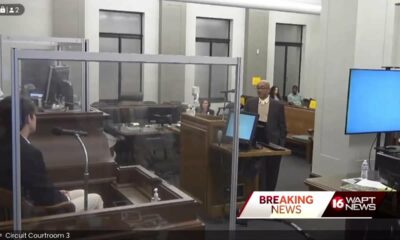Mississippi Today
It is time for Mississippi to celebrate Marjorie Baroni

Marjorie Baroni – one of Mississippi’s most courageous and committed civil rights activists – was born 100 years ago, on Aug. 16, 1924. Historians have taken note of her key role in the struggle for social justice in Natchez, but she is not well-known in her hometown. It is time to rectify that omission by celebrating her life and legacy.
During the last decade, Natchez has begun confronting its history of racism and acknowledging the individuals engaged in the civil rights struggle. Two years ago, it dedicated a monument to the more than 150 Black marchers sent to the MIssissippi State Penitentiary at Parchman in 1965 for protesting for civil rights. In 2015 the Natchez Board of Aldermen passed a resolution apologizing to those Black residents “who suffered these injustices.”
The Natchez Museum of African American History and Culture, established in 1991, and the Natchez Civil Rights Trail Committee now have partnered on a new publication that tells the story of the civil rights movement in their city. The free map of civil rights sites includes photographs and an annotated list of 53 sites along with a QR code that takes readers to the online version of the map. The map may be downloaded at: https://visitnatchez.org/wp-content/uploads/Map-of-Civil-Rights-Sites-Corrected-PDF-Mallory.pdf

This year Mississippi and the nation are marking the 60th anniversary of a key turning point in the civil rights movement, Freedom Summer, of which Baroni played a significant part.
‘You had to follow your conscience’
Marge (as she was known) hardly fits the stereotype of a white activist in the Black-led freedom movement. She was not a do-gooder or a white savior. She was a fearless activist who put herself at great risk, alongside Black Natchezians, to challenge the Jim Crow system.
She was born Majorie Rushing to poor Mississippi sharecroppers and raised in the Baptist church. As a child, she liked to read (including books like Victor Hugo’s “Les Miserables” and Charles Dickens’ “A Tale of Two Cities”) and described herself as a “dreamer” and a “romantic.”
But the harsh realities of poverty and a dysfunctional family (an alcoholic father and a stern mother) intruded on her hopes. Like her parents and five siblings, she endured the hard toil of working the land, including picking cotton. The family moved often, to different tenant shacks and farms in Natchez and Adams County. One of them was the China Grove Plantation, where the Rushings were the only white family. As a young girl, Marge recognized the racial and class differences that kept people apart, sowing the seeds for her later activism and her empathy for the victims of injustice.
After dropping out of Natchez High School during her senior year at age 17, she married 19-year-old Louis Baroni, the son of local sharecroppers from an Italian family. After moving to Connecticut and then New Orleans, where Louis found work in shipyards during World War II, they returned to Natchez and raised six children.
Marge’s intense reading and search for fulfillment led her to convert to Catholicism in 1947 and join St. Mary’s Cathedral. During the 1950s, she led a weekly book club at the church. Cathedral school invited her to speak to high school girls about her conversion.
During this period, she discovered the writings of Dorothy Day, the founder of the Catholic Worker movement, a prolific journalist and a well-known peace activist who inspired thousands of like-minded Catholics to establish homes where they lived with and served poor and homeless people. Describing Day’s influence, Baroni came to believe “you had to follow your conscience, no matter how difficult it was.” The two women soon developed an active correspondence that lasted until Day’s death in 1980. Day, who was 27 years older, occasionally visited Marge in Natchez. Marge, in turn, kept Day abreast of the Southern civil rights struggle.
A major turning point in Marge’s life occurred in 1957, while she was attending a local piano concert. Like all such public events in Natchez at the time, the concert was segregated. As she later wrote:
“The fact that (concerts and plays) were segregated became too much for me. What was I doing there? How could I justify my belief in the fatherhood of God and the brotherhood of man if I had no qualms about enjoying privilege because of the color of my skin?”
Within a few years, she quit her job as the first female editor of the Natchez Democrat, where she wrote a column on cultural and theater events, because she was no longer willing to attend segregated affairs.
“The thing is, it was perfectly acceptable for white people to sit down and talk about how black people were mistreated, so long as one didn’t do anything about it, so long as one didn’t attempt to change it,” she later recounted. “You could deplore it. You could be upset about it. You could say it was wrong. You could point to the Bible. You could read the Bible and study your religion, but you couldn’t practice it.”
Stepping up her activism
By the early 1960s, she was deeply immersed in the civil rights movement, just as the Ku Klux Klan, which had a large presence in Natchez, began terrorizing activists fighting for racial justice. In 1963, Marge volunteered with Natchez’s Freedom Campaign, which challenged the segregated Democratic Party. This effort led to Freedom Summer in 1964, as college students and others from around the country came to Mississippi to help the struggle for voting rights and desegregation.
Marge stepped up her activism. She brought supplies to Natchez’s Freedom Schools, a cornerstone of the movement’s efforts to mobilize Black citizens. She opened her house to Student Non-Violent Coordinating Committee activists to meet and lodge – a risky undertaking.
“After a year of Klan-related beatings, arsons and murders on both sides of the Mississippi River in 1964,” wrote Stanley Nelson, former editor of the Concordia Sentinel and author of several books on unsolved murders of civil rights activists, Marge “begged Monsignor Thomas Fullam, pastor of St. Mary’s Cathedral in Natchez, to ‘preach about it.’” She was devastated when he refused to do so. But she credited Father Fullam with integrating Cathedral School in 1965, a year before local public schools were desegregated.
Marge reached out to Catholic clergy and lay leaders across Mississippi and other Southern states to encourage them to address issues of racial injustice and segregation within the church. She built relationships with the Black parishioners of Natchez’s Holy Family Catholic Church and its white Josephite priests, Father William Morrissey and Father William Danahy, who offered the local NAACP space to meet at the church and who joined its clandestine meetings where they discussed strategies and tactics.
Marge was one of the few white members of Natchez’s NAACP chapter and became friends with its president, George Metcalf. Through those ties, she worked to integrate Natchez’s whites-only library and the dining room at the Eola Hotel and to help register Black voters at Holy Family..

In December 1964, she participated in a sit-in in downtown Natchez as a test of the new federal Civil Rights Act, which prohibited segregation in public accommodations. She joined the six-month-long mass boycott of Natchez’s downtown stores to protest the August 1965 bombing of Metcalf’s car by segregationists (he was seriously injured) and the city’s intransigence in addressing segregation.
She attended hearings of the Civil Rights Commission. At a meeting of the liberal Mississippi Council on Human Relations held at Tougaloo College, she met Mickey Schwerner, a Freedom Summer volunteer from New York, a month before he and two others were killed by Klansmen near Philadelphia, Mississippi.
From 1967 to 1969, Marge worked with the Catholic church and civic leaders to bring funds from the federal anti-poverty program to her hometown by creating the Adams Jefferson County Improvement Corporation. As its assistant director, Marge was on the front lines of these efforts. The agency sponsored the first local Head Start program, adult literacy programs and job training programs for high school students – white and Black. Today these programs seem like common sense, but at the time, they were controversial.
In 1969, and for the next 10 years, she went to work in Fayette, 24 miles from Natchez, as an aide to Charles Evers, a civil rights leader who had been elected the first mayor of a biracial Mississippi town.
Ostracism and death threats
All these and other efforts took a personal toll on Marge and her family. They endured death threats from the KKK, including at least one bomb attempt at their home. On several occasions, shots were fired at their house, once when Louis and their son Philip were sitting on their front porch. Louis worked at the Armstrong Tire factory, a stronghold of KKK members. His fellow white workers refused to talk or socialize with him and he feared for his life. Marge was shunned by most white parishioners at St. Mary’s church, including one-time friends.
Dorothy Day encouraged Marge to persist. In one of her letters, Day praised her “energies and desires to serve the Lord” and her “love of people and interracial justice,” observing, “You have been a voice in the wilderness and a shining light to the blind!”
Although Marge was always a voracious reader, it wasn’t until she was in her 50s that she took the time to complete her formal education. In 1982 she graduated from the University of Southern Mississippi. Over the next four years, she worked as a part-time teacher in Hattiesburg while pursuing her master’s degree from USM. This gave her the opportunity to write about her journey of faith and her involvement in the civil rights movement. For years she documented her experiences in journals, essays, letters, short stories, and autobiographical writings.
Marge was diagnosed with cancer in 1981 and died in 1986. She never finished her graduate degree. Her papers, now part of the archives at the University of Mississippi, provide a chronicle of her life, thoughts and activism and the civil rights movement. Eva Walton (now Kendrick), a graduate student at Ole Miss, mined these documents, as well as interviews, to write her own master’s thesis about Marge, which she completed in 2012.
Other scholars have written about Marge and the Natchez civil rights movement. Yet she remains unheralded in her own hometown and native state, which in recent years have been confronting their own legacy of racism and celebrating those who challenged Jim Crow. This is a good time to honor Marge Baroni for her courage, integrity, and contributions to making Natchez a more humane city and Mississippi a more inclusive state. We all stand on her shoulders.
Terry Meng, a Natchez native and a graduate of its Cathedral School, is a nurse practitioner in Pasadena, California. Peter Dreier is a professor of politics at Occidental College in Los Angeles and co-author of several books, including “The 100 Greatest Americans of the 20th Century: A Social Justice Hall of Fame”.
This article first appeared on Mississippi Today and is republished here under a Creative Commons license.![]()
Mississippi Today
On this day in 1867


Nov. 23, 1867

The Louisiana Constitutional Convention, composed of 49 White delegates and 49 Black delegates, met in New Orleans. The new constitution became the first in the state’s history to include a bill of rights.
The document gave property rights to married women, funded public education without segregated schools, provided full citizenship for Black Americans, and eliminated the Black Codes of 1865 and property qualifications for officeholders.
The voters ratified the constitution months later. Despite the document, prejudice and corruption continued to reign in Louisiana, and when Reconstruction ended, the constitution was replaced with one that helped restore the rule of white supremacy.
This article first appeared on Mississippi Today and is republished here under a Creative Commons license.![]()
Mississippi Today
Crystal Springs commercial painter says police damaged his eyesight

CRYSTAL SPRINGS – Roger Horton has worked decades as a commercial painter, a skill he’s kept up with even with the challenge of having what his wife has called “one good eye.”
It hasn’t stopped him from being able to complete detailed paint jobs and create straight lines without the help of tape. But last year following a head injury, he and others said people have been pointing out a change in his work. Horton says the sight in his right eye is clouded, like he is looking underwater.
Affected vision, short term memory and periods of irritability – potential symptoms of concussion – followed after he was arrested last September. During an encounter with several police officers, Horton alleges more than one slammed his head into a cruiser and placed handcuffs on so tight that he started to bleed.
“(The officer) was kind of rough with me and all, and he takes my head and I said, ‘What’d I do?’” he recalled recently.
Horton ended up being convicted of two misdemeanor charges and has paid off the fines, but a year later he still has questions about the arrest and treatment by the police.
To date, he has not seen a doctor to evaluate his eye and check for vision or cognitive issues. Horton and his wife Rhonda don’t have a car, and transportation to doctor’s appointments in the Jackson area remains a challenge.
The Hortons have lived in Crystal Springs all their lives, and they have lived in the home the past five years that belonged to Rhonda’s mother.
More than a quarter of all people in Crystal Springs live below the poverty line, and that includes the couple. Rhonda Horton said it’s hard to make a living because there aren’t a lot of jobs, but they support themselves as painters.
That’s how they met Yvonne Florczak-Seeman, who lived in Illinois and purchased her first historical property in Crystal Springs in 2019. She splits her time between the two states.
“We painted that porch bar and the rest is history,” Rhonda Horton said, adding that they went on to complete detailed work on mantles, kitchen cabinets and a cigar room at Florczak-Seeman’s North Jackson Street residence.
Over the years, the couple built a relationship with Florczak-Seeman, who is seeking to open a women’s empowerment center called the Butterfly Garden, in the building next to city hall.

Florczak-Seeman has supported the couple numerous times, including helping them pay a late water bill and offering them work. She called them talented painters and hired them again to paint the interior of the future center, located at East Railroad Avenue.
In pieces, Rhonda Horton told Florczak-Seeman about her husband’s arrest and later the injuries she said he sustained from it. Florczak-Seeman had questions about the encounter and other potential injustices at play, so she offered to help.
“I just want them to pay for what they’ve done not just to him, but everybody,” Rhonda Horton said. “That’s what I want, justice.”
The Arrest
On Sept. 24, 2023, Horton was walking home from a friend’s house when officers approached him. One grabbed his arms to handcuff him, and he remembers them cutting his wrist and causing it to bleed.
Then, he said, a second officer slammed his head into the top of the police car, followed by another officer who slammed his head again. During the encounter, a bag of marijuana that Horton said he found fell out of his pocket onto the ground.
An officer put Horton in the back of the cruiser and took him to the station where Horton asked to speak to the police chief and call his wife. He said the police took his phone and clothes.
Afterward, he was taken to the Copiah County Detention Center in Gallman.
Police Chief Tony Hemphill disputed Horton’s allegation of mistreatment, saying he did not sustain any injuries that required hospitalization. He said Horton’s wrist was cut while he resisted arrest.
“He was not brutalized and targeted,” Hemphill said. “If he had just complied, he wouldn’t have had to come up there (to jail) that night.”
Two police reports from the night of the September 2023 arrest detail how officers had responded to a possible assault and were given the description of a white man. While in the area, they encountered Horton — the only person who fit that description.
Hemphill said a mother called police after her daughter told her she was assaulted. He said officers approached Horton on the street and tried to talk with him to rule him out as a suspect.
That’s when Horton began “fighting, pulling away, and kicking against (the officer’s) patrol vehicle, trying to run,” according to a police report from the night and Hemphill. Horton denies doing any of that.
The next day police took Horton from the county jail to the Crystal Springs police station. There, police informed him a teenage girl reported being assaulted. After learning about the assault allegation, Horton remembered feeling shocked and saying it couldn’t be true because he was not on the street where the alleged incident took place.
Hemphill confirmed the police investigated the assault allegation and found it not credible, meaning Horton wouldn’t face any related charges. He said he communicated this to Horton and his wife early on and since then, which the couple disputes.
As Horton was being arrested and detained, his wife grew worried because she had just spoken with him on the phone and expected him to arrive home shortly. Rhonda Horton and her adult son started calling Roger’s phone, each not getting an answer.
Then during one of the calls by her son, someone who did not identify himself answered Roger’s phone and said, ‘Your daddy’s dead’ and then hung up, Rhonda Horton said.
She was starting to assume the worst had happened. Rhonda Horton wouldn’t have confirmation her husband was alive until he called from the county jail in the early morning.
The next morning as she talked with the police chief, Rhonda Horton asked the chief about who answered the phone and told her son that Roger was dead. The chief told her the person who answered must have been from the county.
Hemphill later told Mississippi Today that he did not know about the call and that type of behavior by his staff “is not going to be tolerated.” Similarly, Copiah County Sheriff Byron Swilley said he had not heard about it and could not say whether a member of his department made the comment to Rhonda and Roger Horton’s son.
A Sept. 25, 2023, citation signed by Hemphill, shared with Mississippi Today, summoned Roger Horton to municipal court for the misdemeanor charges of possession of marijuana and resisting arrest and directed him not to have contact with the alleged victim in the assault case. No contact orders are typically for cases such as domestic violence and sexual assault and they are set by a judge.
LaKiedra Kangar, who works in municipal court services, said the no contact order was put in place because of the assault allegation. She confirmed Horton was not charged with the offense following the police department’s investigation of the allegation.
Weeks passed. Roger Horton went to court for the misdemeanor charges, to which he pleaded guilty. Felony assault charges were not part of the hearing. Municipal Court Judge Matthew Kitchens ordered Roger to pay over $900 in fines for the misdemeanors.
Horton was able to pay for some of the fine through at least 10 hours worth of court-ordered community service, which he said involved painting buildings for the city.
Months later after learning about Horton’s arrest and how he said the police treated him, Florczak-Seeman said she wanted to know more. Horton didn’t have access to his arrest documents, so she accompanied him and his wife to the police department to ask for them.
The first visit, Horton asked but did not receive the arrest report. Florczak-Seeman asked if he had a fine for any of the charges, which police said Horton did even after completing some community service hours. Florczak-Seeman paid for the remaining balance and had him work for her for two days to pay that off.
This year, they went to the police department a second time so Horton could ask for his arrest paperwork. An officer told him he didn’t need it and that the rape allegation had been investigated and found not to be credible, Horton told Mississippi Today.
Florczak-Seeman asked why Horton couldn’t receive the report. She said Hemphill asked if she was Horton’s attorney, and Florczak-Seeman clarified she was his representative.
The chief left for a few minutes and returned with two pieces of paper and handed them to Horton. Hemphill told Mississippi Today he did not recall whether he was the one who handed the report to Horton.
Florczak-Seeman took the document from Horton and began to read it as they stood in the lobby. She said she was horrified to see the name of the alleged, underage victim and her address in the report.
Hemphill said the victim’s personal information should have been restricted and not doing so was an oversight.
After reading the report, Florczak-Seeman went down the street to the mayor’s office at city hall to explain what happened, and how she believed the mayor had grounds to fire the police chief because he provided that document to Roger with the alleged victim’s information.

Mayor Sally Garland confirmed she had a conversation with Florczak-Seeman about the police chief’s employment.
She said she reviews all complaints about city officials, and Garland said she goes to the department head to get a better understanding of the situation. If she determines there are potential grounds for termination, a hearing would be scheduled with the Board of Aldermen, and the group would vote on that decision.
Garland did not find grounds for termination, and Hemphill remains police chief.
A Strange Visit
The Hortons and Florczak-Seeman hadn’t given much thought about the 2023 arrest, until weeks ago when a teenaged girl suddenly showed up in Florczak-Seeman’s yard.
At the end of September at the North Jackson Street home, Florczak-Seeman heard screaming and found the teenage girl who came onto her property. She asked what was wrong, and the teenager said she was chased by a dog, which Florczak-Seeman and Rhonda Horton did not see.
The teenager asked for a soda, and Rhonda Horton went inside to get one. Florczak-Seeman asked where the teenager lived, and she gave an answer that Florczak-Seeman said conflicted with what two girls who were standing nearby on the public sidewalk said she told them.
Then Florczak-Seeman asked the teenager’s name and recognized it as the name of the alleged victim on Horton’s arrest record. Immediately, Florczak-Seeman said she turned to Horton and told him to stay back, and she told the teenager to get off her property, which she did.
At the moment, they were not able to verify whether the teenager was the alleged victim from the report. Neither the Hortons nor Florczak-Seeman had seen her before, and they only knew her name from the arrest report.
“That didn’t make sense at all,” Rhonda Horton told Mississippi Today.
Florczak-Seeman called 911 to report the situation and ask for police to come, which they did not. Hemphill told Mississippi Today a dispatcher informed him about the call with Florczak-Seeman, including details with the teenage girl and how she wanted to report the girl for trespassing.
Florczak-Seeman is one of the people who have noticed a difference in Horton’s vision. It’s clear when comparing the detailed and clean paint job Roger completed at her Jackson Street property in 2019 and the center where he painted last year.
During an interview at the center in October, Florczak-Seeman pointed to the ceiling and noted spots that Horton did not paint. She remembers telling him about them and realized that he couldn’t see them.
“The spots on my ceiling are still not painted, and they’re not painted as a reminder of the injustices that happened in this situation and why I got involved,” Florczak-Seeman said.
This article first appeared on Mississippi Today and is republished here under a Creative Commons license.![]()
Mississippi Today
Job opening: Jackson Reporter

Mississippi Today, a Pulitzer Prize-winning newsroom focused on investigative and accountability journalism, is building a dedicated team of reporters to provide in-depth coverage of Jackson, Mississippi.
As the state’s largest and capital city, Jackson matters greatly to us and all Mississippians. Launched in 2016 as the state’s flagship nonprofit newsroom focused on Mississippi government and policy, Mississippi Today is focusing our lens beyond the statehouse and to the city of Jackson, serving our readers with the watchdog reporting they’ve come to expect from Mississippi Today. Our newsroom, with a proven record of providing impactful government accountability, aims to serve the city more directly with this team.
Our Jackson team will focus on sharp investigative reporting, watchdog accountability journalism and meaningful cultural storytelling. We aim to both elevate the voices of those working for positive change in the community while offering a balanced perspective on the city’s obstacles and triumphs. Our goal is to deliver impactful, honest journalism that will inform, inspire and empower Jackson’s citizens.
The team will be led by Pulitzer Prize winner Anna Wolfe, an investigative reporter with a decade of experience covering Jackson.
Roles and Responsibilities:
- We are purposefully casting a wide net, hoping to connect with journalists of many different backgrounds who may be uniquely qualified to help us launch this team. If you’re a reporter with any of the following experience or attributes, this team may be for you.
- Investigative reporting focused on uncovering systemic issues within government and politics. The bigger the impact of your reporting on government leaders or systems, the better.
- Political reporting covering not only high-profile candidates for offices, but experience delving into issues and ideas that affect a community. We hope to delve deeply into a deep distrust in the city’s institutions.
- Cultural reporting that highlights the often-overlooked success stories of citizens who are making a positive impact on their communities.
- Strong understanding of Jackson (or similar large urban centers) and the unique challenges facing the city and its residents.
- Commitment to the mission of balanced, impactful journalism that centers and respects the voice of the community.
- Collaborative mindset and ability to work within a team-oriented newsroom.
The starting salary for this position is $58,000. Compensation is commensurate with experience level.
Expectations:
- Work with a small team of journalists who are focused on social inequities and racial equality in our area.
- Willingness to collaborate closely with a small team of like-minded journalists.
- Get people to talk, find willing sources and protect them while telling sensitive and timely stories.
- Build trust: Many people who have been impacted by inequities in Mississippi have been victims of predatory practices and forces. This will require empathy, patience and savvy.
- Work with our Audience Team and data and visual journalists to create compelling story presentations.
Qualified candidates should have:
- Experience working as a reporter in a newsroom.
- Ability to work quickly, with accuracy and good news judgment.
- Comfortability in digital or multimedia journalism spaces.
- Ability to independently develop and cultivate sources.
- Ability to use social media for research and to engage readers.
What you’ll get:
- The opportunity to work alongside award-winning journalists and make significant contributions to Mississippi’s top nonprofit, nonpartisan digital news and information sources.
- Highly competitive salary with medical insurance, and options for vision and dental insurance.
- Use of appropriate technology and equipment.
- 29 days paid time off.
- Up to 12 weeks of parental family leave, with return-to-work flexibility.
- Simple IRA with 3 percent company matching. Group-term life insurance provided to employees ($15,000 policy).
- Support for professional training and attending industry conferences.
How to Apply:
We’re committed to building an inclusive newsroom that represents the people and communities we serve. We especially encourage members of traditionally underrepresented communities to apply for this position, including women, people of color, LGBTQ people and people who are differently abled. Please apply here.
This article first appeared on Mississippi Today and is republished here under a Creative Commons license.![]()
-

 Local News7 days ago
Local News7 days agoCelebrate the holidays in Ocean Springs with free, festive activities for the family
-

 Kaiser Health News5 days ago
Kaiser Health News5 days agoA Closely Watched Trial Over Idaho’s Near-Total Abortion Ban Continues Tuesday
-

 Local News4 days ago
Local News4 days agoSherral’s Diner to be featured on America’s Best Restaurants
-

 Mississippi Today7 days ago
Mississippi Today7 days agoOn this day in 1972
-

 News from the South - Georgia News Feed3 days ago
News from the South - Georgia News Feed3 days agoJose Ibarra found guilty in murder of Laken Riley | FOX 5 News
-

 News from the South - Alabama News Feed4 days ago
News from the South - Alabama News Feed4 days agoTrial underway for Sheila Agee, the mother accused in deadly Home Depot shooting
-

 News from the South - Kentucky News Feed3 days ago
News from the South - Kentucky News Feed3 days agoNicholasville organization activates weather plan in response to bitter cold temperatures
-

 News from the South - Alabama News Feed3 days ago
News from the South - Alabama News Feed3 days agoAlabama's weather forecast is getting colder, and a widespread frost and freeze is likely by the …


























